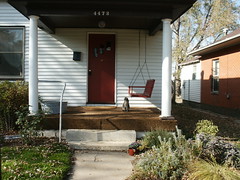Landscapes use water.
So why do we need them in a semi-arid state with irritable growing conditions? Good question!
Just like you can use a rope to hang yourself or do something productive, our landscapes can be counter-productive resource drain—or not. There’s always a choice, except that in Colorado it really is no longer optional to waste water in our landscapes or anywhere else for that matter.
Most of us like having some grass and plants around our homes, schools, businesses and recreation areas. Nicely landscaped areas are pleasing to our senses and maintain curb appeal and property values. And don’t overlook the feel-good vibes from walking barefoot on the lawn or smelling a rose. There’s something intrinsically nice about our landscapes, but does “nice” really justify having them if it means using lots of water to keep them?
That, of course, is the question of the hour. So back to the rope: to be productive in Colorado, landscapes have to serve a purpose and be sustainable. Here are some things to consider:
- Plants bring environmental benefits to urban areas. Leaves absorb dust in the air and absorb pollutants. Plants that shade paved areas can cut summer temps as much as 10 degrees.
- The average tree absorbs 26 lbs. of carbon dioxide from the air each year.
- One tree—or a 2,500 sq. ft. lawn—releases enough oxygen each day to supply a family of four.
- When water is allowed to run through a landscape, it typically exits cleaner than when it entered which helps keep pollutants out of ground water.
- When edibles are part of the landscape, you get to harvest locally grown food for yourself and your family and probably get some good exercise in the process.
Starting to get the picture?
Landscapes can be as productive as we make them. But sustainable, productive landscapes don’t just happen. When we plan landscapes that use less-thirsty plants, that grow edibles, that provide cooling shade and which are sculpted to route rain water through them rather than just running off—we are being sustainable. The outdoor spaces we create in that process do serve a purpose. And when we use the latest water-saving irrigation technology so that we water our plants without waste, we’re really on track with being sustainably productive.
This month, get out your rope, cut yourself some slack – and see just how productive you can be in your landscape.
Courtesy Associated Landscape Contractors of Colorado, the professional organization of the landscape contracting industry that has about 700 member companies in six chapters statewide. www.alcc.com.


 Print
Print